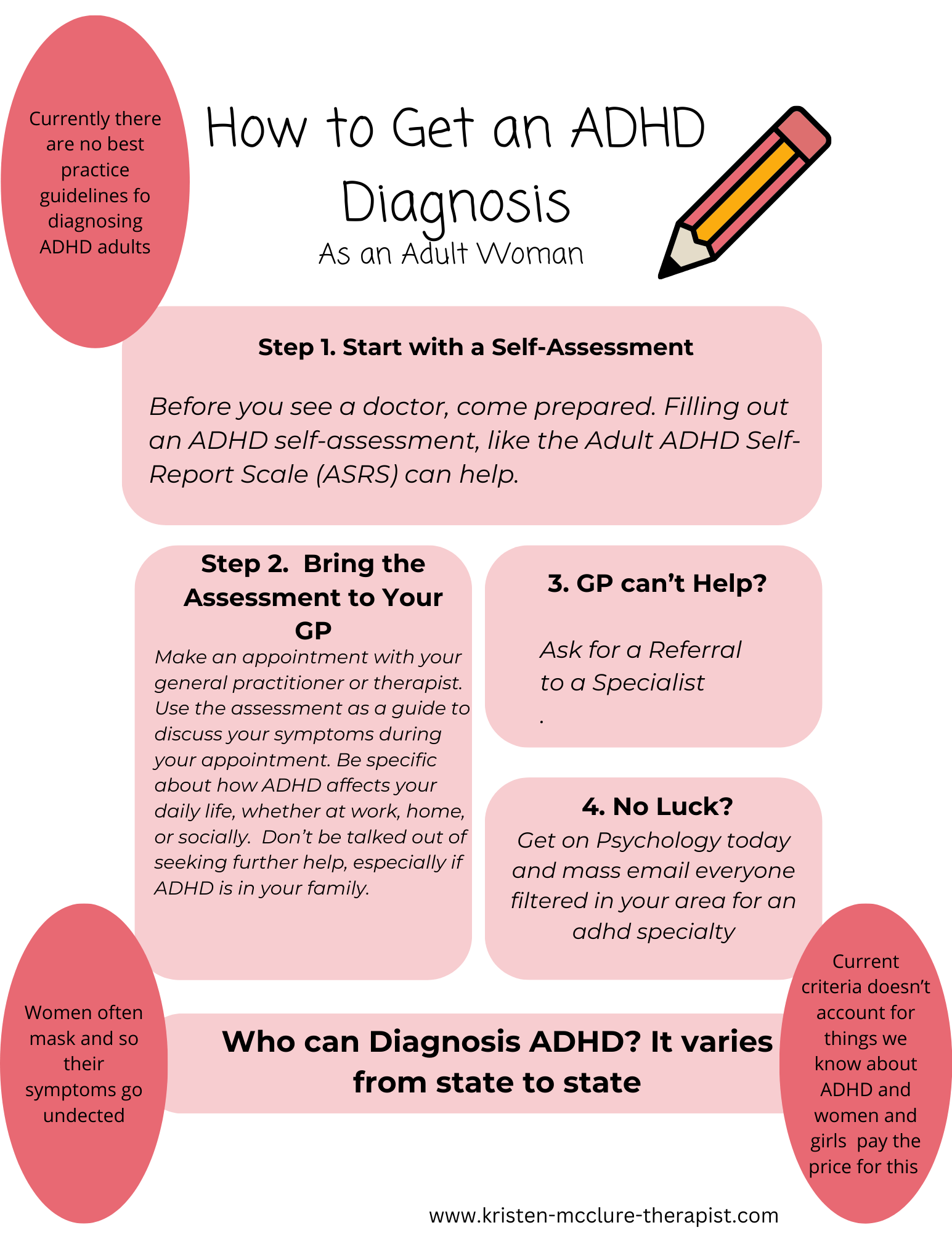How to Get an ADHD Diagnosis as a Woman: Step-by-Step Guide for Women Seeking Answers

How to Get Diagnosed with ADHD as a Woman: Clear Action Steps
If you think you might have ADHD, knowing where to start can feel overwhelming. Women often face unique challenges when seeking an ADHD diagnosis, and symptoms are commonly overlooked or misinterpreted. Here’s a step-by-step guide to help you navigate the process of how to get diagnosed with adhd and get the answers you need.
Step 1: Start with a Self-Assessment
Before you see a doctor, come prepared. A great way to do this is by filling out an ADHD self-assessment, like the Adult ADHD Self-Report Scale (ASRS). This tool will help you evaluate your symptoms and give your doctor a clearer picture of what you’re experiencing.
Here’s an example of a question from the ASRS:
- How often do you have trouble wrapping up the final details of a project once the challenging parts are done?
- Never
- Rarely
- Sometimes
- Often
- Very Often
Complete the form and bring it with you to your doctor’s appointment. The ASRS helps you articulate your symptoms in a way that makes them more accessible for your doctor to understand.
Step 2: Bring the Self-Assessment to Your GP
Once you’ve completed the self-assessment, make an appointment with your general practitioner (GP). Use the form as a guide to discuss your symptoms during your appointment. Be specific about how ADHD affects your daily life, whether at work, home, or socially.
Your GP may not be familiar with diagnosing ADHD in adult women, so having the ASRS in hand will help guide the conversation and make your "case" more straightforward.
Many doctors may begin making assumptions the moment you walk in, dismissing your concerns as part of a trend where women self-diagnose based on social media, rather than recognizing the complexity of what you're truly experiencing.
Important: Don’t let comments like “But you did well in school, so you can’t have ADHD” or “You have a stable job, how could you have ADHD?” discourage you. Many women with ADHD develop coping strategies to mask their symptoms and push through these challenges. That doesn’t mean ADHD isn’t present—it just means you’ve been working extra hard to manage it.
Step 3: Ask for a Referral to a Specialist
If your GP feels it’s appropriate, or if they’re uncomfortable diagnosing ADHD, ask for a referral to a specialist. This could be a psychiatrist or psychologist who can conduct a full evaluation.
Who Can Diagnose ADHD?
Several professionals can diagnose ADHD, depending on where you live:
- Psychiatrists: Mental health doctors who can assess, diagnose, and prescribe medications.
- Psychologists: They can conduct thorough assessments and cognitive tests but can’t prescribe medications.
- General Practitioners (GPs): Some GPs can diagnose ADHD but may refer you to a specialist for a deeper evaluation.
- Licensed Professional Counselors (LPCs) or Social Workers (LCSWs): In some states, these professionals can diagnose ADHD but cannot prescribe medication.
Step 4: If You Fail, Try Again
If your GP or specialist isn’t helpful, don’t give up. Having a GP or even a therapist tell you that you don't have ADHD doesn't mean your concerns are not valid.
Not every woman who suspects she has ADHD does, but not every woman who is told she doesn’t is necessarily free of it, either! Here’s how to pursue an accurate ADHD diagnosis and find the right support:
Use Psychology Today to search for ADHD specialists in your area. You can filter by location and area of expertise, helping you find a provider who understands adult ADHD in women.
Once you’ve found local specialists, mass-email them to ask if they can help or recommend someone who can. Here’s a template you can use:
Sample Email Template:
Subject: Seeking ADHD Assessment
Dear [Doctor/Counselor's Name],
I hope this message finds you well. I’m reaching out to see if you offer ADHD assessments for adult women. I’ve been experiencing symptoms like disorganization, difficulty focusing, and emotional overwhelm, and I’m looking for someone who can help with an assessment.
If you don’t offer this service, do you have recommendations for someone in the area who does?
Additionally, I’d appreciate any information on your fees or insurance coverage, as I’m trying to find an option that fits within my budget/insurance provider ([Your Insurance Provider]).
Thank you for your time, and I look forward to hearing from you.
Best regards,
[Your Name]
Pro tip: Copy and paste this email and send it to as many specialists as possible. This increases your chances of finding someone quickly. Even if they can’t help, they might recommend someone who can. Make sure to ask about costs or insurance coverage upfront to save time.
Step 5: Recognize Obstacles and Misconceptions
It’s common to encounter misconceptions when seeking an ADHD diagnosis. Here are some comments you might hear—and should ignore:
-
“You can’t prove you had it in childhood.” ADHD in women is often missed in childhood because symptoms tend to be less disruptive than in boys. Many women develop strong coping mechanisms early on.
-
“You did well in school, so you can’t have ADHD.” Women often overcompensate in structured environments like school by working extra hard or becoming perfectionists. Success doesn’t mean ADHD isn’t there.
-
“You have a stable job, so you don’t have ADHD.” Having a job doesn’t mean you aren’t struggling with ADHD. Many women manage their symptoms quietly while dealing with exhaustion, overwhelm, or burnout behind the scenes.
Times in Life You Might Seek a Diagnosis
ADHD symptoms often become more noticeable during significant life transitions or stressful periods. Here are some times when you might consider seeking a diagnosis:
- Pregnancy/Postpartum: Hormonal changes can intensify ADHD symptoms.
- Perimenopause/Menopause: Hormonal fluctuations can worsen symptoms.
- College: The unstructured environment of college often reveals ADHD struggles that were masked in high school.
- Career promotions or job stress: As responsibilities grow, so do the demands on your attention, organization, and focus.
- Major life transitions: Moving, starting a family, or going through a divorce can trigger stress that makes ADHD more noticeable.
Take Charge of Your Diagnosis Journey
Getting diagnosed with ADHD as a woman can be challenging, but it’s worth it. You can find the support and answers you need by starting with a self-assessment, having an open conversation with your GP, and not giving up when you hit obstacles.
Quick Recap of How to Get Diagnosed With Adhd:
- Please complete the ADHD self-assessment (like the ASRS) and bring it to your doctor.
- Start the conversation with your GP, and request a referral to a specialist if necessary.
- If your GP isn’t supportive, use Psychology Today to find a specialist who understands ADHD in women.
- Mass-email specialists using the template above and ask about financial limitations or insurance coverage upfront.
- Understand the obstacles and be prepared to push past myths about ADHD.
- Recognize life transitions where ADHD might become more noticeable, such as during pregnancy, perimenopause, or significant career changes.
By following these steps, you can get closer to understanding your symptoms and getting the support you need to thrive. Keep advocating for yourself—you deserve it!





